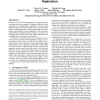Free Online Productivity Tools
i2Speak
i2Symbol
i2OCR
iTex2Img
iWeb2Print
iWeb2Shot
i2Type
iPdf2Split
iPdf2Merge
i2Bopomofo
i2Arabic
i2Style
i2Image
i2PDF
iLatex2Rtf
Sci2ools
MOBISYS
2015
ACM
2015
ACM
Accelerating Mobile Applications through Flip-Flop Replication
Mobile devices have less computational power and poorer Internet connections than other computers. Computation offload, in which some portions of an application are migrated to a server, has been proposed as one way to remedy this deficiency. Yet, partition-based offload is challenging because it requires applications to accurately predict whether mobile or remote computation will be faster, and it requires that the computation be large enough to overcome the cost of shipping state to and from the server. Further, offload does not currently benefit network-intensive applications. In this paper, we introduce Tango, a new method for using a remote server to accelerate mobile applications. Tango replicates the application and executes it on both the client and the server. Since either the client or the server execution may be faster during different phases of the application, Tango allows either replica to lead the execution. Tango attempts to reduces user-perceived application late...
Related Content
| Added | 14 Apr 2016 |
| Updated | 14 Apr 2016 |
| Type | Journal |
| Year | 2015 |
| Where | MOBISYS |
| Authors | Mark S. Gordon, David Ke Hong, Peter M. Chen, Jason Flinn, Scott A. Mahlke, Zhuoqing Morley Mao |
Comments (0)

